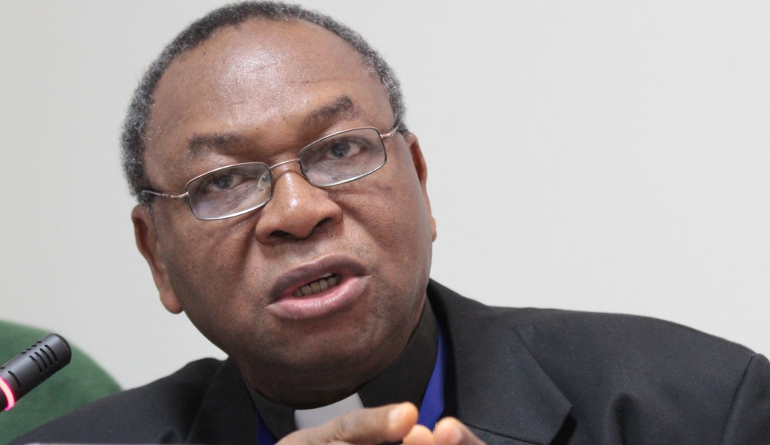
Abuja, Nigeria, Archbishop John Onaiyekan speaks at the Catholic Theological Ethics in the World Church gathering in Nairobi Aug. 22. (Photo courtesy of Jesuit Fr. Yiu Sing Lucas Chan)
Archbishop John Onaiyekan of Abuja, Nigeria is one of six prelates Pope Benedict XVI announced this morning would be elevated to the College of Cardinals.
If the recent record is any indication, Onaiyekan’s fellow cardinals might expect a colleague who is willing to speak frankly about issues facing both the church and wider society.
Wednesday’s move will make the archbishop the 18th cardinal from the world’s second-largest continent when he officially receives his red hat along with the other prelates at a ceremony in Rome Nov. 24.
Onaiyekan, aged 68, will also be one of only 11 prelates from Africa who will be able to vote in the next conclave, the secret meeting of cardinals which assembles following a pope’s death to elect the next pontiff. Cardinals lose their ability to vote in a conclave once they turn 80.
In August, Onaiyekan was one of three African bishops who took part in a seminal gathering of the continent’s theologians, held some 2,000 miles southeast of his Abuja archdiocese in Nairobi, Kenya.
That gathering, put together by a global network of scholars called Catholic Theological Ethics in the World Church, saw each of the bishops speak openly about the problems facing their local churches. Briefly mentioned too was the question of the ordination of women in the Catholic church.
In his Aug. 22 talk, Onaiyekan focused on interfaith relations. Nigeria, which is located between Cameroon and Benin on the Atlantic ocean in West-central Africa, is split roughly half and half between Muslims and Christians.
Decrying media coverage of terrorist violence in his country, Onaiyekan said that “most of the time we live in peace.”
"I think the world is not congratulating us enough for what we do," he continued.
For example, he said, media accounts of a Christmas Day 2011 attack on churches failed to report that among the 41 people killed in the attacks were several Muslims who were walking by the churches as the explosions occurred.
"Every human being is a human being," Onaiyekan said. "If a Muslim is killed, a human being is killed. And we must talk about it."
The next day, the future cardinal brought up what might be called the third rail of Catholic conversations. Towards the end of a panel on Catholic theological understandings of feminism, Onaiyekan stood up.
Saying he wanted to raise an issue “about which we are all nervous,” he asked the two women on the three-person panel: “Have you experienced any handicap in your theologizing because you have no access to ordination?”
Linda Hogan, vice provost of Trinity College Dublin and a member of the theological group's planning committee who was serving as the panel's moderator, first replied that it was important to think of the vocations to ministry and academia differently.
But, Hogan said, she'd rather ask another question in reply.
"Does the church experience itself a sense of loss because of the absence of ordained women in the church?" she asked. "I don't know the answer because we haven't talked about it."
Asked by NCR at a reception following the panel if he had been wary to bring up the topic of women priests, Onaiyekan said he didn't mind mentioning the subject, replying “I’ve got nothing to lose.”
After the November ceremony marking his official elevation to cardinal, Onaiyekan will become Nigeria’s third prelate with a red hat, following Cardinal Francis Arinze, a former prefect of the Vatican’s Congregation for Divine Worship and the Discipline of the Sacraments, and Cardinal Anthony Okogie, the retired archbishop of Lagos, Nigeria’s former capital.
One of 52 dioceses in the country, Lagos is located on the Atlantic ocean, some 500 miles southwest of Onaiyekan’s Abuja archdiocese, located in the center of the country.
Arinze will lose his ability to vote in the conclave that elects the next pope Nov. 1, when he turns 80.
Onaiyekan was also honored in August as Pax Christi International's 2012 peace laureate. He’ll officially accept the prize at a ceremony Oct. 31 in Brussels, Belgium.

